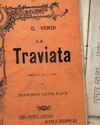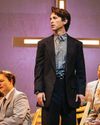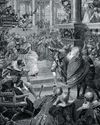
Remembered almost exclusively as a supporting role in someone else’s biopic, Antonio Salieri really deserves a film in his own right. A workaday composer, living in the shadow of a genius; a dull establishment figure to Mozart’s bohemian freelancer – these are the clichés that film and fiction have passed down to posterity.
In fact, Salieri was an orphaned teenager who was ‘saved’ by the kindness of others, and who would ultimately find himself working for royalty, being courted by theatres all over Europe and associating with the most celebrated artistic figures of the era. Though the music textbooks have chosen to forget the fact, he was a composer of considerable historic significance, both through his own artistic reforms and through the influence he had on many of the major composers and singers of the early-19th century.
Salieri was born in 1750 in Legnago, a small town on the border between two Italian states, the Kingdom of Venice and the Duchy of Mantua. Details of his childhood are scant, but it is clear he grew up in a household where music was encouraged and that he showed early promise. It was fortunate indeed that when he lost his parents he was taken under the wing of a wealthy family acquaintance: one Giovanni Mocenigo, who took him to Venice – then an exceptionally vibrant and important operatic centre – for musical training. This led in turn to an even luckier break in the form of an introduction to the chamber composer to Emperor Joseph II of Austria, Florian Gassmann, who visited Venice regularly to write operas for the Carnival. Gassmann agreed to take the boy on as a pupil and musical apprentice, taking him back with him to Vienna.
この記事は BBC Music Magazine の April 2024 版に掲載されています。
7 日間の Magzter GOLD 無料トライアルを開始して、何千もの厳選されたプレミアム ストーリー、9,000 以上の雑誌や新聞にアクセスしてください。
すでに購読者です ? サインイン
この記事は BBC Music Magazine の April 2024 版に掲載されています。
7 日間の Magzter GOLD 無料トライアルを開始して、何千もの厳選されたプレミアム ストーリー、9,000 以上の雑誌や新聞にアクセスしてください。
すでに購読者です? サインイン

A way with words
Great operas are inextricably linked with their composer but, asks Jessica Duchen, how often do we acknowledge the important role of the librettist?

THE MAGNIFICENT SEVEN Pick a theme... and name your seven favourite examples
Conductor Domingo Hindoyan nominates the best musical depictions of anger and frustration
A glittering beacon
Until its destruction in the fire of 1936, the Crystal Palace was one of the world's most exciting music venues, and its legacy still lives on today, writes Tom Service.

Christoph Willibald Gluck
Paul Riley traces the wandering existence of a cosmopolitan composer who made it his life's work and ambition to rip up opera's rulebook

The Awards are upon us once more!
Time to vote for the best recordings of the last 12 months

LEADING FROM THE FRONT
From running efficient rehearsals to learning to speak to orchestras with clarity and empathy, an array of exciting courses for conductors has bloomed in recent years, finds Clare Stevens

Kindred spirits
As their second opera takes to the stage, composer Gregory Spears and librettist Tracy K Smith talk to Charlotte Smith about their special partnership

The censors' refusal to play ball drives Verdi to despair
In the early months of 1857, Verdi had Shakespeare on his mind, and specifically King Lear.

11 Bed-Hopping Composers
Jeremy Pound lifts the covers off those notorious notesmiths who found the thrill of playing away simply too hard to resist

André Rieu Violinist, Conductor
King of the Waltz, Dutch musical impresario André Rieu has taken the world by storm with his Johann Strauss Orchestra.